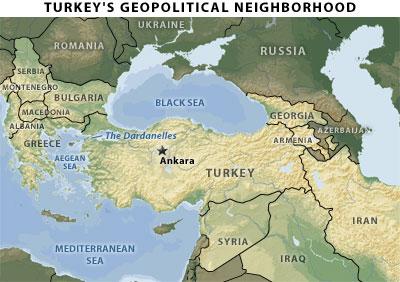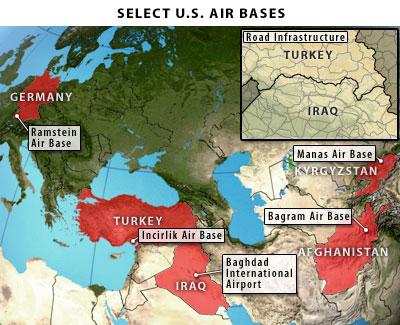The same argument was taking place in Turkey following the 1991 Gulf War, when the Iraqi Kurds were granted autonomy. Soon enough, Turkey in 1995 sent 35,000 troops into northern Iraq to crush Kurdish rebels and squash Iraqi Kurdish aspirations for independence. The same episode is repeating itself today, as Iraqi Kurdistan has made strides in attracting foreign investment and extending its autonomy since the 2003 U.S. invasion of Iraq. Turkey opposed the invasion by refusing U.S. access to Turkish military bases, and now is threatening to set up roadblocks along the U.S. military's logistics chain into Iraq and upset Washington's relations with the Kurds.And this probably is just the beginning. Since the end of the Cold War, Turkey's neighborhood -- and its relationship with Washington -- has drastically changed. Attempts to become a Central Asian or European power have failed, and the Turks are looking in different directions for opportunities. The Iraq war has proven that U.S. and Turkish security concerns are no longer in lockstep, leading Turkey to re-evaluate its alliance with the United States.
From the Turks' viewpoint, the United States can no longer be viewed as a stabilizing force, as it has been since World War II. Moreover, Turkey no longer is a weak economic force and is not as reliant on the United States for its security. Turkey's rapid economic growth and its strong military tradition are creating the conditions for Ankara to pull itself out of its post-World War I insularity and extend itself in the region once again. As a result, Turkey's foreign policy no longer needs to tie itself to the United States, and Ankara can afford to make bold moves concerning issues -- whether those issues relate to the Kurds, Armenians or Greeks -- without losing too much sleep over any follow-on damage to its relationship with the United States. If the United States is going to act as the destabilizing force in the region through creating a major upheaval in Iraq, Turkey must at the very least attempt to take control of the situations within its old sphere of influence.
But this does not mean Turkey can make a clean break from the United States either, at least not any time in the near future. Turkey's growth is still fragile and needs more time to become consolidated. Turkey also faces resistance in every direction that it pushes, from Greece in the Balkans, Iran, Iraq and Syria in the Middle East and Russia in the Caucasus. Turkey's current position puts it into a geopolitical context where Iran is rising to Turkey's southeast and a resurgent Russia is bearing down on the Caucasus and even hinting at returning its naval fleet to the Mediterranean. In the near term, a major power is needed in Iraq to keep the Iranians at bay, and the Turks would prefer that the Americans do the heavy lifting on this since Iraq already is in disarray. Meanwhile, Turkey will move forward with its grand strategy of keeping Iraqi Kurdistan in check.

Today then,new U.S. Joint Chiefs of Staff Chairman Adm. Michael Mullen called up his Turkish counterpart, Gen. Yasar Buyukanit, to discuss the repercussions to U.S.-Turkish relations from the proposed Armenian bill before the U.S. Congress. The bill labels the 1915 massacre of Armenians by Ottoman Turks genocide. The big fear in the Pentagon is that if the resolution passes, Turkey will follow through with threats to further limit use of Incirlik Air Base in southeastern Turkey for support of operations in Iraq.Turkish Prime Minister Recep Tayyip Erdogan described the current strain between Washington and Ankara with a Turkish idiom, saying recently, "Where the rope is worn thin, may it break off." Such big threats coming out of Ankara over a symbolic resolution on an event that occurred almost a century ago might seem odd at first glance. But they become clearer once it is understood that the Armenian issue, as well as Turkey's military push into northern Iraq against Kurdish rebels, are issues that cut to the heart of Turkish geopolitics -- and thus carry significant implications for the future of U.S.-Turkish relations.
The U.S.-Turkish alliance, on shaky ground after Ankara's 2003 refusal to allow the United States to invade Iraq from Turkish soil, thus continues to suffer.The concern for the U.S. military is that Turkey could express its anger over the debate by closing its doors to cargo and refueling operations -- which would affect military operations in Iraq and Afghanistan.Of all the U.S. air cargo bound for U.S. forces in Iraq, 70 percent passes through Turkey, as does 33 percent of the fuel. Incirlik Air Base, long a major U.S. foothold in the region, is a major hub for KC-135 Extender refueling operations, as it is well-positioned for topping off the C-17 and C-5 cargo flights that haul most of the air freight to Iraq and Afghanistan. Although air cargo traffic can be rerouted (at a price), and Baghdad is within reach of a C-130 fully fueled at Germany's Ramstein Air Base, the U.S. military relies heavily on Ankara's good graces for the transfer of fuel -- both in the air and on the ground -- in order to conduct its operations in Iraq and Afghanistan. Turkey also is the only friendly airspace through which the United States can easily move north to Europe, and it is the fastest route for medical evacuation flights from Baghdad to military hospitals in Germany.

Should Turkey stop allowing U.S. ground fuel shipments into Iraq, the United States would be forced to shift even more ground traffic to the south, which would make the United States increasingly reliant on an already heavily taxed supply chain into Kuwait (one always vulnerable to a Shiite uprising in the south). It also would shift the fuel metrics, requiring more gasoline for more trucks to drive farther to deliver fuel, a process that was more economically -- not to mention safely and reliably -- provided by the northern route.This northern route looked faintly promising for another U.S. purpose less than a month ago. At that time, Turkish Prime Minister Recep Tayyip Erdogan suggested that the United States might be allowed to withdraw its troops to the north as the drawdown of Washington's surge begins. Although in practice this would not have been an easy arrangement to hammer out -- the Turks do not want an increased U.S. military presence in the border region -- it did offer an important alternative exit strategy from Iraq. For now, this arrangement looks lost.
Their shared NATO membership will hold the United States and Turkey together to some extent -- meaning the vital Turkish airspace likely will remain open to U.S. forces -- though powerful geopolitical forces are at work in Ankara.Turkey still could complicate U.S. logistics efforts through any number of restrictions and administrative curveballs -- and this would hardly be unprecedented, even among fellow NATO members. Such actions, however, would be distractions the Pentagon, whose resources already are strained, does not need. The Turkish alliance and Incirlik Air Base are cornerstones of the U.S. presence in an unfriendly region, and Washington can ill afford to lose those now.